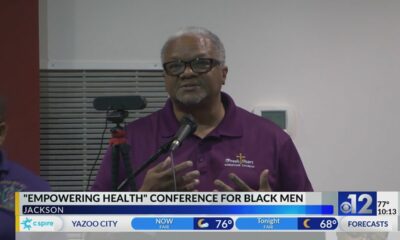Mississippi Today
Statewide Black organizations write Sen. Hyde-Smith to voice support for Colom
Statewide Black organizations write Sen. Hyde-Smith to voice support for Colom
Three prominent statewide Black organizations are asking U.S. Sen. Cindy Hyde-Smith to reconsider her decision to block the confirmation of Columbus District Attorney Scott Colom as a federal judge for the Northern District of Mississippi.
The Mississippi Legislative Black Caucus, state chapter of the NAACP and the Magnolia Bar Association, which is an organization of more than 100 African American lawyers across the state, have sent letters to the state's junior U.S. senator touting Colom's qualifications and his bipartisan support.
“He is a successful and well-respected member of the legal profession,” said a letter from Monica McNeely, president of the Magnolia Bar, one of the oldest Black bar associations in the country.
“Attorney Colom's range of legal experience, his reputation for professionalism and integrity and his record of community engagement demonstrates his qualifications for service on the United States District Court.”
Colom was nominated in October by President Joe Biden to replace Judge Mike Mills who is stepping down from full-time service on the federal judiciary.
The Magnolia Bar, Legislative Black Caucus and state chapter of the NAACP all wrote separate letters to Hyde-Smith expressing their disappointment in blocking his confirmation and asking to meet with her to discuss the issue.
The blue slip process allows home-state senators of nominees to block their Senate confirmation, though Senate Judiciary Chair Dick Durbin, D-Illinois, is being urged to abandon the process. Many past judiciary chairs have not used the blue slip process as an absolute in blocking nominees from being considered in the Senate. Durbin has called Colom highly qualified.
Hyde-Smith's office did not respond to questions from Mississippi Today on whether she might reconsider her decision to block Colom's confirmation process. She has said she opposes Colom's nomination because his campaign was helped financially by progressive groups and because of his stance on trans issues.
In a letter from the Mississippi Legislative Black Caucus, Rep. Chris Bell, D-Jackson, who chairs the group, wrote that the refusal to confirm a qualified Black attorney like Colom would send the wrong message to Black professionals.
“We are concerned that your decision to deny Mr. Colom even a hearing with his record of service would send a signal to other young Black lawyers that Mississippi will not promote lawyers to prestigious positions on the federal bench and discourage them from moving back home, especially to small, rural towns like Columbus,” said the letter from the Black Caucus, which consists of 53 members of the Mississippi Legislature.
Robert Jones, president of the state chapter of the NAACP, wrote of the bipartisan support for Colom, who was nominated for the post by a Democratic president. The letter pointed out that Republican Roger Wicker, the state's senior U.S. senator, had said he would not block Colom's confirmation process and that Republican U.S. Rep. Trent Jones of Lee County, who represents a large portion of the area Colom serves as district attorney in northeast Mississippi, “has consistently supported Mr. Colom's nomination.”
The letters also cited endorsements from at least nine law enforcement leaders in Colom's district.
“Recently, even former Republican governors Phil Bryant and Haley Barbour have publicly supported Mr. Colom's nomination, with Gov. Bryant saying ‘Scott Colom possesses the discernment to be a fair and exemplary judge,'” said the letter from the NAACP, which boasts more than 11,000 members in Mississippi.
The groups pointed out that as district attorney Colom had personally tried 26 criminal cases and obtained 24 guilty verdicts.
“We understand Mr. Colom may not be a nominee you feel that you could vote for but to deny him even a hearing, when he has the support of the senior senator, sets a bad precedent and isn't good for our state,” the NAACP letter read.
In a statement earlier this month, Hyde-Smith cited a concern about Colom's “opposition to legislation to protect female athletes.”
While Colom has voiced general support for trans rights, he has never publicly commented on the issue of trans women competing in women sports. Hyde-Smith seems to be referring to a letter Colom signed condemning the criminalization of gender-affirming care, rejecting the prosecution of the families of transgender individuals seeking treatment to help them transition.
Hyde-Smith also said she opposed Colom because a political action committee funded at least in part by billionaire George Soros spent funds on his first election to the office of district attorney in 2015. Soros, a New York billionaire, has supported criminal justice reform and other issues such as governmental transparency.
Colom did not receive any financial help from Soros in 2019.
Colom is the first Black elected as district attorney in the 16th District and, according to the letters the first African American elected to the post of district attorney from a white majority district.
This article first appeared on Mississippi Today and is republished here under a Creative Commons license.
Mississippi Today
On this day in 1961
MAY 20, 1961

A white mob of more than 300, including Klansmen, attacked Freedom Riders at the Greyhound Bus Station in Montgomery, Alabama. Future Congressman John Lewis was among them.
“An angry mob came out of nowhere, hundreds of people, with bricks and balls, chains,” Lewis recalled.
After beating on the riders, the mob turned on reporters and then Justice Department official John Seigenthaler, who was beaten unconscious and left in the street after helping two riders.
“Then they turned on my colleagues and started beating us and beat us so severely, we were left bloodied and unconscious in the streets of Montgomery,” Lewis recalled.
As the mob headed his way, Freedom Rider James Zwerg said he asked for God to be with him, and “I felt absolutely surrounded by love. I knew that whether I lived or died, I was going to be OK.”
The mob beat him so badly that his suit was soaked in blood.
“There was nothing particularly heroic in what I did,” he said. “If you want to talk about heroism, consider the Black man who probably saved my life. This man in coveralls, just off of work, happened to walk by as my beating was going on and said ‘Stop beating that kid. If you want to beat someone, beat me.' And they did. He was still unconscious when I left the hospital.”
To quell the violence, Attorney General Robert Kennedy sent in 450 federal marshals.
This article first appeared on Mississippi Today and is republished here under a Creative Commons license.
Mississippi Today
Podcast: The controversial day that Robert Kennedy came to the University of Mississippi
Retired U.S. Bankruptcy Judge Edward Ellington talks with Mississippi Today's Bobby Harrison and Geoff Pender about former U.S. Attorney General Robert Kennedy's speech at the University of Mississippi less than four years after the riots that occurred after the integration of the school. Ellington, who at the time headed the Ole Miss Speaker's Bureau as a law school student, recalls the controversy leading up to the speech.
This article first appeared on Mississippi Today and is republished here under a Creative Commons license.
Mississippi Today
2024 Mississippi legislative session not good for private school voucher supporters
Despite a recent Mississippi Supreme Court ruling allowing $10 million in public money to be spent on private schools, 2024 has not been a good year for those supporting school vouchers.
School-choice supporters were hopeful during the 2024 legislative session, with new House Speaker Jason White at times indicating support for vouchers.
But the Legislature, which recently completed its session, did not pass any new voucher bills. In fact, it placed tighter restrictions on some of the limited laws the state has in place allowing public money to be spent on private schools.
Notably, the Legislature passed a bill that provides significantly more oversight of a program that provides a limited number of scholarships or vouchers for special-needs children to attend private schools.
Going forward, thanks to the new law, to receive the vouchers a parent must certify that their child will be attending a private school that offers the special needs educational services that will help the child. And the school must report information on the academic progress of the child receiving the funds.
Also, efforts to expand another state program that provides tax credits for the benefit of private schools was defeated. Legislation that would have expanded the tax credits offered by the Children's Promise Act from $8 million a year to $24 million to benefit private schools was defeated. Private schools are supposed to educate low income students and students with special needs to receive the benefit of the tax credits. The legislation expanding the Children's Promise Act was defeated after it was reported that no state agency knew how many students who fit into the categories of poverty and other specific needs were being educated in the schools receiving funds through the tax credits.
Interestingly, the Legislature did not expand the Children's Promise Act but also did not place more oversight on the private schools receiving the tax credit funds.
The bright spot for those supporting vouchers was the early May state Supreme Court ruling. But, in reality, the Supreme Court ruling was not as good for supporters of vouchers as it might appear on the surface.
The Supreme Court did not say in the ruling whether school vouchers are constitutional. Instead, the state's highest court ruled that the group that brought the lawsuit – Parents for Public Schools – did not have standing to pursue the legal action.
The Supreme Court justices did not give any indication that they were ready to say they were going to ignore the Mississippi Constitution's plain language that prohibits public funds from being provided “to any school that at the time of receiving such appropriation is not conducted as a free school.”
In addition to finding Parents for Public Schools did not have standing to bring the lawsuit, the court said another key reason for its ruling was the fact that the funds the private schools were receiving were federal, not state funds. The public funds at the center of the lawsuit were federal COVID-19 relief dollars.
Right or wrong, The court appeared to make a distinction between federal money and state general funds. And in reality, the circumstances are unique in that seldom does the state receive federal money with so few strings attached that it can be awarded to private schools.
The majority opinion written by Northern District Supreme Justice Robert Chamberlin and joined by six justices states, “These specific federal funds were never earmarked by either the federal government or the state for educational purposes, have not been commingled with state education funds, are not for educational purposes and therefore cannot be said to have harmed PPS (Parents for Public Schools) by taking finite government educational funding away from public schools.”
And Southern District Supreme Court Justice Dawn Beam, who joined the majority opinion, wrote separately “ to reiterate that we are not ruling on state funds but American Rescue Plan Act (ARPA) funds … The ARPA funds were given to the state to be used in four possible ways, three of which were directly related to the COVID -19 health emergency and one of which was to make necessary investments in water, sewer or broadband infrastructure.”
Granted, many public school advocates lamented the decision, pointing out that federal funds are indeed public or taxpayer money and those federal funds could have been used to help struggling public schools.
Two justices – James Kitchens and Leslie King, both of the Central District, agreed with that argument.
But, importantly, a decidedly conservative-leaning Mississippi Supreme Court stopped far short – at least for the time being – of circumventing state constitutional language that plainly states that public funds are not to go to private schools.
And a decidedly conservative Mississippi Legislature chose not to expand voucher programs during the 2024 session.
This article first appeared on Mississippi Today and is republished here under a Creative Commons license.
-
Our Mississippi Home7 days ago
Beat the Heat with Mississippi’s Best Waterparks
-
SuperTalk FM4 days ago
State auditor cracking down on Mississippians receiving unemployment benefits
-
Mississippi News Video6 days ago
Jackson has a gang problem
-
Local News3 days ago
Family files lawsuit after teen’s suicide in Harrison County Jail
-
Kaiser Health News7 days ago
Medicaid ‘Unwinding’ Decried as Biased Against Disabled People
-
Mississippi Today5 days ago
On this day in 1950
-
228Sports6 days ago
George County Pours Runs In 6A South State Title Victory At PRC
-
Local News Video6 days ago
In the Kitchen with J's Restaurant








































